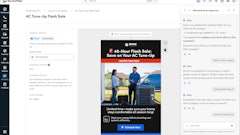Do you sometimes feel as if you are the last to know what's going on in your company or on your jobsite? Do you have employees who know of equipment problems but have not informed you? Have you ever found an important message to call a customer on your desk — a week after the message was written down?
If you are like most contractors, the thought of not knowing everything can keep you up at night. For many of us, information that is delivered “just in time” is the best information whether it is good or bad news. Being held in the dark about the condition of equipment can delay work, which in turn can anger customers and maybe even lose jobs. And calling a customer a week after the fact is not only embarrassing but it too can cost you valuable jobs.
How can we get our employees to be more assertive about getting important information to us? Consider a few of the suggestions below.
- Be accessible to your people. Most contractors are on the move and impossible to pin down. You must ensure your accessibility through any means available. Cell phones, texting, email these are just tools of our leadership.
- Be quick to respond. Contractors who are slow to return voice mails or text messages, and would rather just leave the caller with their own voicemail, send non-verbal signals that say, “don’t bother me!” Returning messages promptly reinforces your commitment to be available even when you’re not present.
- Lead by “wandering” around. In this case, wandering around is a proactive effort to connect with your employees. If you are out, call your office staff to check in with them for messages or any assistance you might provide. If you are in the office, contact your crew leaders periodically to check in with them to receive a job update.
- Schedule private meeting times. Identify who your more key people are and schedule one-on-one meetings with them, weekly if necessary. These meetings may be only five minutes in length but they establish accountability between you and your people.
- Continue to encourage your people to reach out to you. Just telling your people to contact you whenever they need you will not be enough to convince most employees. Calling the boss is still a sign of not knowing, and most employees don’t want to signal to you their lack of knowledge.
- Be an active listener. Shut up when your employees are talking! Take notes, let them finish sentences and analyze what is being shared before responding. Employees who feel the boss will cut them off at the knees are less likely to initiate a conversation.
- Don’t “shoot the messenger.” When your supervisor tells you a truck broke down ... again, don’t take out your frustration on them. Reinforce your commitment to solve problems, not to point fingers. If you have a people problem, then address the person in trouble, not the messenger who is passing along information.
- Thank employees for good and bad news. When you receive bad news, don’t explode and walk off cussing your head off, leaving the messenger there to wonder their next move. Receive the bad news with a “poker face.” If you need to explode, go outside and kick your car tires, but don’t cause a scene.
- Welcome questions. Perhaps the biggest reason many employees don’t quickly pass on information to the boss is they don’t feel the boss wants to entertain questions. While some questions may be “bogus,” the vast majority of your employees ask good questions that will provide them with a more clear understanding of any situation. If you really feel that all your employees only ask stupid questions then you should assess your own hiring practices. You’ve probably got problems in how you hiring process that are keeping you from hiring the right people.
Our employees are critical to our success. Unless you want to execute your specialty all by your lonesome, you better learn to sharpen your communication skills with your employees. Certainly one easy area to improve first is training your people to get needed information to you fast.



















